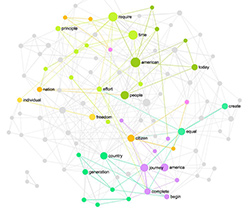Posted by Nodus Labs | March 5, 2012
Tribes and Cultural Group Selection Models
Note: We contacted AssystComplexity to allow us to embed this video on Nodus Labs. In the meanwhile you can watch it on their website.
David Hales from Open University talks about the rational drive behind the human capacity to change their social surrounding. He presents a model where individuals “copy” the social constellations that they perceive to be more successful and that offer them more of the “social good” that they are after. In his model the ability to create new groups at a fast rate is a crucial factor for successful innovation. The social structure undergoes through the dynamic transformation while the individuals defect the existing groups and form the new ones with the purpose of propagating their innovative ideas. Hales proposes that the online social networks expand this capacity to quickly form temporary communities around certain causes, some of which can then become successful enough to engage the individuals away from their existing social circles.
We at Nodus Labs found this talk quite interesting as it proposes a different point of view on the process of what we call “inclusive exclusivity” – the process of simultaneous inclusion of the nodes from the periphery and the exclusion of the most connected hubs in order to retain the network’s heterogeneous structure with multiple shifting central nodes.
The talk was recorded at the Interdisciplinary workshop on the evolution of social norms that took place on the 15-16 December 2011 at Henley Business School in UK.

